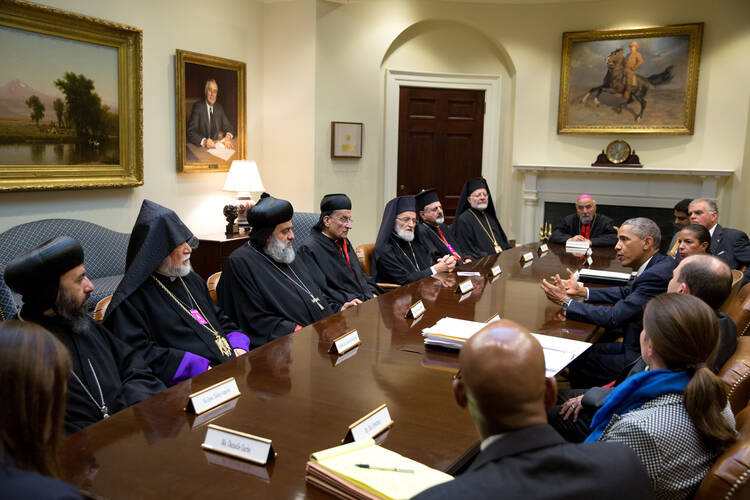United in the suffering of their people, five Catholic and Orthodox patriarchs from the Middle East urged Westerners to take action to help ensure that Christians and other minorities can remain in the Middle East.
"Christians are not (just) looking for humanitarian aid. They are looking for humanitarian action, to save Christianity in the Middle East," said Catholicos Aram of Cilicia, patriarch of the Armenian Apostolic Church.
The Armenian patriarch said a comprehensive strategy is needed to defeat the Islamic State extremism that "threatens the very survival of Christianity" in places like Iraq and Syria. He said it was essential to promote human rights, pluralism and religious freedom.
The Sept. 11 panel was part of the Sept. 9-11 inaugural summit, In Defense of Christians, a new Washington-based group formed to promote awareness of the plight of Christians in the Middle East, and to advocate on their behalf to U.S. policymakers.
In a keynote address earlier that morning, Syriac Orthodox Patriarch Ignatius Aphrem II of Antioch spoke of meeting a Syrian Christian father whose wife and two children had been murdered and whose bodies were thrown down a well. The patriarch also described meeting a Christian boy among 50 families who had fled for their lives and taken refuge in a small, crowded church hall in the Kurdish region of Iraq. The boy opened his arms, saying, "We have no place!" Others were sleeping in tents, on the street or in parks, the patriarch said.
"Is there no place for Christians in the land of their ancestors?" asked Patriarch Aphrem, who noted that he and other religious leaders have written to the United Nations and the European Union seeking help.
During the panel discussion, Lebanese Cardinal Bechara Rai, Maronite patriarch, encouraged the international community to take steps to support development projects to help ensure Christians' ongoing presence in the cradle of Christianity.
"The future is in the hands of those who sow seeds of hope in the hearts of young people and future generations," he said.
Syriac Catholic Patriarch Ignace Joseph III Younan called on Muslim leaders to issue a statement "to condemn the atrocities committed against Christians and other minorities" in the Middle East. He also called on "the family of nations" to support religious freedom and the separation of church and state in the region.
Earlier that morning, Patriarch Younan called for the international community to help find a solution that would allow thousands of Christian refugees to return to their homes in northern Iraq and Syria.
"We have the right to live in our own land, the land of our ancestors for millennia. ... Our forefathers endured persecution and even martyrdom because they were faithful to the Lord Jesus," he said. "We keep hope in the Lord, who repeated many times in the Bible, 'Don't be afraid.'"
During the patriarchs' panel, Melkite Catholic Patriarch Gregorios III Laham urged that a peaceful solution be found.
"We call on America to be peacemakers, not war-makers," he said.
"It's time for the world to realize that no one wins a war," he added.
During opening remarks that morning, Bishop Angaelos, general bishop of the Coptic Orthodox Church of Alexandria, decried the "persecution, genocide, religious and ethnic cleansing we're seeing today" in the Middle East, but he said that the worst outcome would be for Christians to respond with hate. Rather, Christians are called to reflect Christ's love and light amid that darkness, and to remain a reconciling presence in the region as they have for 2,000 years, he said.
The Coptic bishop praised the summit gathering, saying: "We are not only in defense of Christians. We are in defense of Muslims. We are in defense of Jews. We are in defense of those who have no faith, of everyone. That is the message of this summit."
Also during opening remarks, Antiochian Orthodox Metropolitan Joseph of New York and All North America told a crowd of mainly Middle East Christians in the diaspora, "What began as an Arab Spring has become a harsh winter of violence and extremism."
He noted that Christians in the region have lived there "since the very first proclamation of the Gospel by the apostles almost 2,000 years ago." Christians, who early in the 20th century constituted about 20 percent of the population of the Middle East, are now only 5 percent of its people. Instead of the world facilitating a Christian exodus or exile from the region, the Christians there "wish to keep their homes and lands, and to be apostles of peace," the Orthodox archbishop said.
He urged decision-makers to seek a peaceful resolution to the crisis there.
"Stop the violence. Don't destroy. Rebuild those beautiful countries. May God help us be peacemakers," he said.








